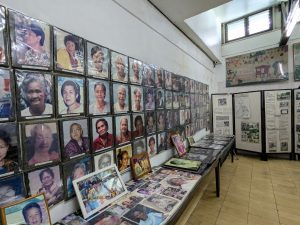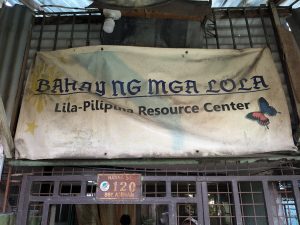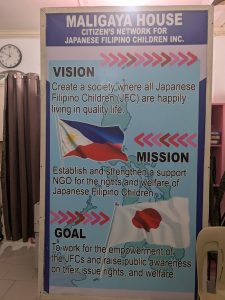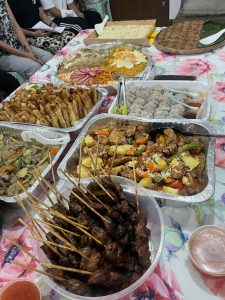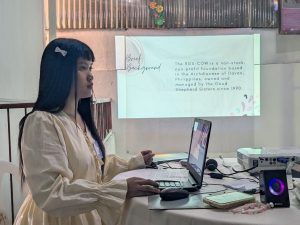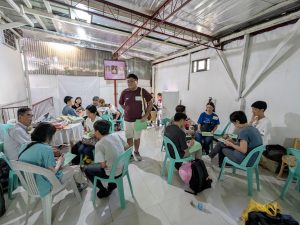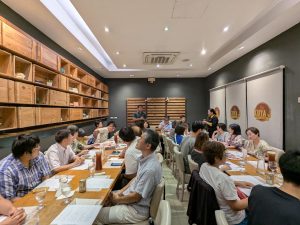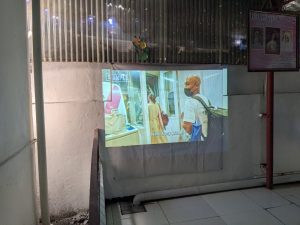ニュース詳細
![]() 2025.08.10
2025.08.10
2025年7月31日~8月5日までスタディツアを実施しました♪
2025年7月31日~8月5日までJFCネットワークはスタディツアを実施しました。今年の参加者は20名でした。(※English is below.)
初日はマリガヤハウスでソーシャルワーカーのクリスティンさんより活動内容の説明があり、その後、JFCの2名、フィリピン人のお母さん1名のスピーチがありました。時には感極まって涙を浮かべながらのお話はとても心を打つ内容でした。
2日目はリラ・フィリピーナ(Lila Filipina)を訪問しました。この団体は、日本軍の占領下において、日本軍による性奴隷の被害を受けた慰安婦を支援しています。1990年代までに174名の被害女性が名乗りをあげたそうですが、現在、存命者は10名以下とのことでした。リラ・フィリピーナには、被害女性たちの写真や活動の記録など多くの資料が展示・保存されていました。
3日目はダバオへ移動し、RGSーCOW(The Religious of the Good Shepherd -Center for Overseas Workers in Davao:カトリックダバオ大司教区にある非営利団体の善き牧者修道会移民労働者センター)で丸1日、プログラムを実施しました。
最初に、RGS-COWのプログラムコーディネータのフィデスさんからRGS-COWの活動紹介がありました。RGS-COWは1990年にダバオを中心にフィリピン人移民労働者支援のために設立したセンターで、2007年からJFCの権利や福祉のための活動をミッションとして掲げて活動をして下さっています。
RGS-COWは、法的支援だけでなく、JFC母子のエンパワメントのための活動にも力を入れているため、コミュニティとしての組織力があり、JFCや母親たちの横の連帯が強いです。さらに、移住女性ための権利擁護、人身取引や性被害予防などのためのアドボカシー活動の他、ジェンダー平等や人権など、自立した人として生きて生きていくために必要なことについて学ぶセッションも定期的に実施するなどJFC母子へのトータルなサポートを実践しています。
その後、JFCたちから歌の披露があり、2人のJFCがスピーチをしました。一人は父から遺棄、もう一人は両親から遺棄されるという壮絶な経験をしていますが、大勢の前で自分のつらいストーリーを語る決心は相当なものだったと思います。それでも、勇気をもって語ることを決心してくれ、涙を流しながらの語りはとても心を打つものでした。
その後、ミリエンダ休憩をはさんで武内剛監督の映画「パドレプロジェクト」の上映会をしました。このフィルムは2歳の時に生き別れた父親を40歳になってからイタリアまで探しにいく武内剛さんの父親探しの旅の記録です。
私(伊藤)はこの「パドレプロジェクト」に出会った時、フィリピンにいるJFCたちと一緒に観たいと思いました。上映中、涙を流しながら観ていたJFCたちが多くいましたが、その後のワークショップが多くのJFCたちにとって有意義なものになってくれたらとても嬉しいです。
JFCや母親たちだけでなく、ツアー参加者たちも3つのグループに分かれて「父親像」についてディスカッションしました。ツアー参加者たちからは「父親像」として、権威主義や家父長制といったネガティブなものが出された一方、「父親」の固定観念にとらわれず、夫婦や親子が対等な関係を築けるような価値観の変化が必要という意見などが出ていました。
JFCのグループもワークショップ中は、一人ひとり真剣に向き合い、ときには涙を流しながら自分と父親の関係や経験を語りあったそうです。
母親グループは「理想的な父親像」はとても理想的でしたが、父親としての役割、母親としての役割という枠を取っ払い、子どもの親としての役割とは何かを考えていけると心が少し楽になるのではないかと感じました。
ワークショップ後は、参加者たちはJFC母子のホームステイ先に向かい、翌日の夕方までホームステイ先で過ごしました。
4日目はホームステイ先から戻り、シェアリングをしました。どの参加者たちも、ホームステイ先での経験や感想を率直に語ってくださり、よい経験ができたと思います。
5日目はダバオからマニラへ戻り、ショッピングモールで買い物をした後、元マニラ新聞の記者の酒井善彦さんから「日系人の歴史」についての講義を頂きながら会食しました。日本が貧しかった時代、多くの日本人が豊かな暮らしを求めてダバオに移住し、マニラ麻の栽培に従事し豊かな日系人社会を形成しました。その後、第二次世界大戦がはじまり日系人社会は一変しました。JFC問題は戦争とリンクしており、日本政府は「JFC問題」を私的問題と短絡的に捉えず国として救済をすべきだと酒井さんは熱く語って下さいました。
今年も充実したツアーでした。マリガヤハウスやRGS-COWで売れ入れをして下さったスタッフの皆さん、JFCやお母さんたちに心から感謝します。そして、最初から最後まで添乗・通訳として細やかにご対応下さった太田貴さんに心から感謝します。JFCとしての貴さんの一言一言が通訳を超えた説得力をもつ言葉として参加者たちに届けられたと感じています。
From July 31 to August 5, 2025, the JFC Network conducted a study tour. This year, 20 participants took part.
On the first day, we visited Maligaya House, where social worker Ms. Christine explained the organization’s activities. This was followed by speeches from two JFC members and a Filipino mother. Their heartfelt stories, which at times brought tears to our eyes, were truly moving.
On the second day, we visited Lila Filipina. This organization supports women who were forced into sexual slavery by the Japanese military during the occupation. By the 1990s, 174 victims had come forward, but currently, fewer than 10 survivors remain. Lila Filipina houses numerous photographs and records of the victims’ experiences, which are displayed and preserved.
On the third day, we traveled to Davao and spent the whole day participating in a program at RGS-COW (The Religious of the Good Shepherd – Center for Overseas Workers in Davao: a non-profit organization of the Catholic Archdiocese of Davao).
First, Ms. Fides, the program coordinator of RGS-COW, introduced the activities of RGS-COW.RGS-COW was established in 1990 in Davao to support Filipino migrant workers, and since 2007, it has been working to promote the rights and welfare of JFCs.
RGS-COW not only provides legal support but also focuses on empowering JFC mothers and their children, which has helped build a strong community and solidarity among JFCs and their mothers.Additionally, RGS-COW conducts advocacy activities for the rights of migrant women, prevention of human trafficking and sexual violence, and regularly holds sessions on gender equality, human rights, and other topics essential for living as independent individuals. These efforts provide comprehensive support for JFC mothers and their children.
After that, JFC members performed songs, and two JFC gave speeches. One had been abandoned by her father, and the other by both parents, but I think it took a lot of courage for them to decide to share their painful stories in front of so many people. Despite that, they decided to speak up with courage, and their tearful stories were very touching.
After a milienda break, we screened the film “Padre Project” by director Tsuyoshi Takeuchi. This film is a record of Tsuyoshi Takeuchi’s journey to find his father, whom he was separated from at the age of two, in Italy at the age of 40.
When I (Ito) first learned about “Padre Project,” I had a strong desire to share it with the JFCs in the Philippines. Many of the JFCs were moved to tears during the screening, and I hope that the workshop that followed was a meaningful experience for them.
Not only the JFCs and their mothers, but also the tour participants were divided into three groups to discuss their images of their fathers.Some tour participants mentioned negative aspects of “father figures,” such as authoritarianism and patriarchy, while others suggested that it is necessary to change the fixed notion of “father” and build a relationship of equality between spouses and parents and children.
During the workshop, the JFC group also faced each other seriously, sometimes shedding tears as they talked about their relationships with their fathers and their experiences.
The mothers’ group felt that the “ideal image of a father” was very idealistic, but that it would be easier to feel at ease if they could think about what it means to be a parent to their children without being bound by the roles of father and mother.
After the workshop, the participants went to the homes of JFC mothers and their children and stayed there until the evening of the following day.
On the fourth day, they returned from their homestays and shared their experiences. All of the participants spoke openly about their experiences and impressions of their homestays, and I think it was a good experience for everyone.
On the fifth day, we returned to Manila from Davao, went shopping at a shopping mall, and then had dinner while listening to a lecture on the history of Japanese descendants in the Philippines by Mr. Yoshihiko Sakai, a former journalist for the Manila Shimbun.During Japan’s period of poverty, many Japanese immigrated to Davao in search of a better life and engaged in the cultivation of Manila hemp, forming a prosperous Japanese community. However, with the breakout of World War II, the Japanese community underwent a drastic change. Mr. Sakai strongly emphasized that the JFC issue is linked to the war and that the Japanese government should not treat it as a private matter but rather as a national issue requiring relief.
This year’s tour was also very fulfilling. I would like to sincerely thank all the staff members who assisted us at Maligaya House and RGS-COW, as well as the JFC and thier mothers. I would also like to express our heartfelt gratitude to Mr. Takashi Ota, who provided thoughtful guidance and interpretation throughout the entire tour. I feel that his words as a JFC carried a persuasive power that went beyond mere interpretation, reaching the hearts of all participants.
